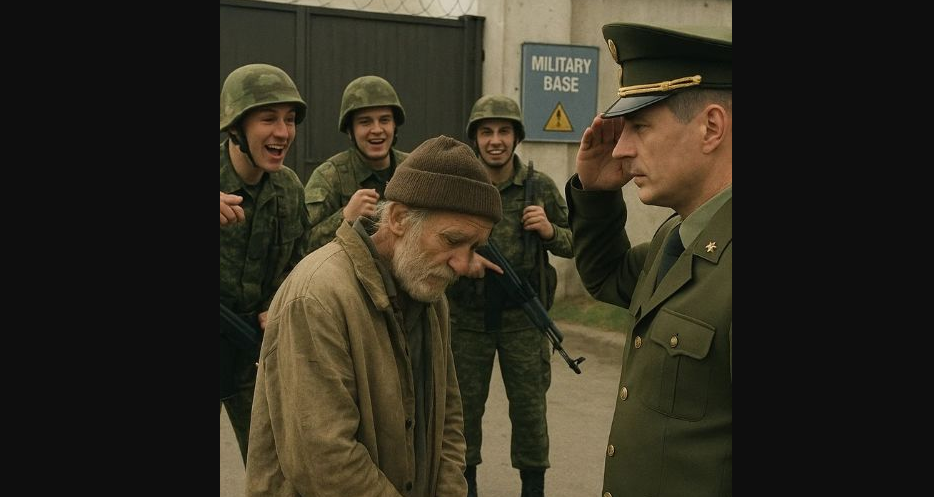It was visiting day at the base. Families, guests, and civilians arrived to see loved ones, tour the grounds, and witness the awards ceremony scheduled for noon.
Just after 11:30, an elderly man arrived. He was thin, slightly hunched, wearing a faded jacket and worn boots. He walked with the help of a cane and held a folded American flag carefully under his arm.
The guards at the entrance exchanged unsure glances.
“Are you sure you’re not lost, sir?” one of them asked.
The man replied calmly, “No. I’m here for the ceremony.”
A young soldier behind the gate made a quiet remark. “Probably just here for the free lunch.” Others chuckled nearby. “Maybe he thinks it’s a museum tour.”
The man didn’t respond. He stood quietly, eyes focused on the field ahead.
One of the officers went to speak with a superior.
“There’s a civilian here who says he’s attending the ceremony, but he doesn’t have clearance. And he’s alone.”
“Should we escort him off the base?” someone whispered.
Before a decision was made, the doors of the command building opened.
A general, dressed in full uniform, stepped outside, accompanied by aides. As soon as he saw the elderly man, he came to attention, then walked directly toward him and offered a firm salute.
Everyone nearby went silent.
The general lowered his hand and spoke in a clear voice for all to hear:
“Permission to speak freely, Master Sergeant?”
The old man stood as straight as he could. “Permission granted, General.”
Surprised looks swept across the area. Recruits who had been laughing seconds before now stood awkwardly. Some saluted out of confusion. The guards appeared uncomfortable.
The general continued, “I thought you were overseas, sir.”
“I came back a few months ago. Quietly. Didn’t want to make a fuss,” the old man replied, nodding toward the parade grounds. “But I heard today was special.”
“It is,” the general said. “But your presence makes it even more so.”
He turned to a nearby lieutenant.
“Get him a seat. Front row. And bring him some cold water.”
The young officer, clearly embarrassed, hurried to follow the order.
The recruits who had mocked him moments earlier now avoided eye contact. Some backed away, others stood still in silence. The old man, however, showed no sign of anger. He simply followed the general, the flag still tucked under his arm.
An older woman seated near the front leaned toward her husband and whispered, “Who is he?”
Her husband replied, “No idea. But the general called him ‘Master Sergeant’ — like he outranks him.”
Whispers began to spread. Guests looked up his name. But the old man had no phone. No visible medals. Just a folded flag and a quiet presence.
As the ceremony began, the old man sat silently in the front row, watching young soldiers receive awards and recognition. When the national anthem played, he stood — slowly, with effort — holding the flag close to his chest.
After the applause, the general returned to the podium.
“I’d like to make an unexpected announcement,” he said. “Someone very special is with us today. A man who served our country with great honor.”
He paused, then said:
“Master Sergeant Raymond Elkins.”
Gasps could be heard. One officer even stood.
“For those unfamiliar,” the general continued, “Master Sergeant Elkins served in three wars — Korea, Vietnam, and the Gulf. He volunteered for the most difficult missions, never asking others to do what he wouldn’t.”
“He saved lives. He trained leaders. He helped build the very foundation of this base.”
The audience, previously whispering, now applauded. Some stood. Some wiped away tears.
Elkins nodded respectfully. He didn’t appear to have come for recognition.
The general raised a hand to quiet the crowd. “And there’s one more thing. That flag he’s carrying… it belonged to Corporal Jared Monroe.”
There was a visible reaction in the crowd.
Jared Monroe was a well-known name on the base. A soldier who gave his life in Afghanistan, protecting fellow troops during a mission. He was awarded the Silver Star posthumously.
The general continued, “Corporal Monroe served under Master Sergeant Elkins. More than that — he was his grandson.”
Another wave of surprise swept through the crowd.
“After his grandson’s passing, Sergeant Elkins didn’t retire. He returned to duty — to train recruits. To make sure others came home safe. And he’s been doing it quietly, without recognition, ever since.”
Elkins stood once more, still holding the folded flag.
The general said, “Today, we honor him not with medals or awards, but with something more meaningful — our respect.”
The entire audience rose. Applause echoed across the grounds. Some soldiers stood at attention. Others clapped until their hands hurt.
Afterward, the general approached him again.
“I owe you an apology,” he said quietly. “They should have known who you were.”
Elkins smiled. “They’re young. They’ll learn.”
“Would you like to say a few words?” the general asked.
The old man looked at the crowd, thoughtful.
Then he stepped forward, leaning slightly on his cane, and addressed the audience.
“I’m not much for speeches,” he said, his voice steady. “But I’ll say this.”
He looked down at the flag in his hand.
“This flag doesn’t stand for politics or pride. It stands for people. Real people. Good people.”
He paused for a moment.
“I’ve seen men fall so others could rise. I’ve seen young boys grow into strong leaders and come home changed. The uniform doesn’t make us better than anyone else — but it reminds us that we serve something greater than ourselves.”
He glanced toward the younger recruits in the back.
“One day, you may grow old. And maybe the world will forget your name. But if you live right… if you love your country and your fellow man… someone will remember the way you stood when it mattered.”
There was silence.
Then, one person clapped. And another. Until the entire field was applauding again.
Later that afternoon, after most had gone home, the old man sat quietly on a bench by the edge of the field. The flag rested in his lap.
The young recruit who had earlier joked approached him.
“Sir?” he said, nervously.
Elkins looked up.
“I just wanted to say I’m sorry. I didn’t know who you were.”
“You didn’t need to,” Elkins replied. “You just needed to listen.”
The recruit nodded and sat beside him.
“May I ask… why did you come today? Just for your grandson?”
Elkins shook his head gently.
“Not just for him. For all of them. For every young person who thinks they’re not strong enough. For every soldier who needs to believe someone sees them.”
The recruit nodded again. “I’ll remember that.”
Elkins smiled. “Then I’ve done what I came to do.”
As the sun began to set and the base quieted, the general returned one last time. He handed Elkins a small envelope.
“What’s this?” Elkins asked.
“An official invitation. We’re naming the new training facility after you.”
Elkins looked surprised.
“You don’t have to do that.”
“We do,” the general replied. “We absolutely do.”
A week later, a plaque was placed at the entrance of the new facility.
It read:
The Raymond Elkins Training Facility
In honor of the quiet strength behind every brave soldier.
From that day on, every recruit who passed through those gates learned his story.
And the young recruit who once made fun of him? He became one of the highest-performing in his unit — and eventually, a respected trainer himself.
On his desk, he kept a photo of Master Sergeant Elkins. Right next to a folded American flag.
Because sometimes, those who speak the least… teach the most.




